Ten cheers for our new Children’s Laureate!
0 Replies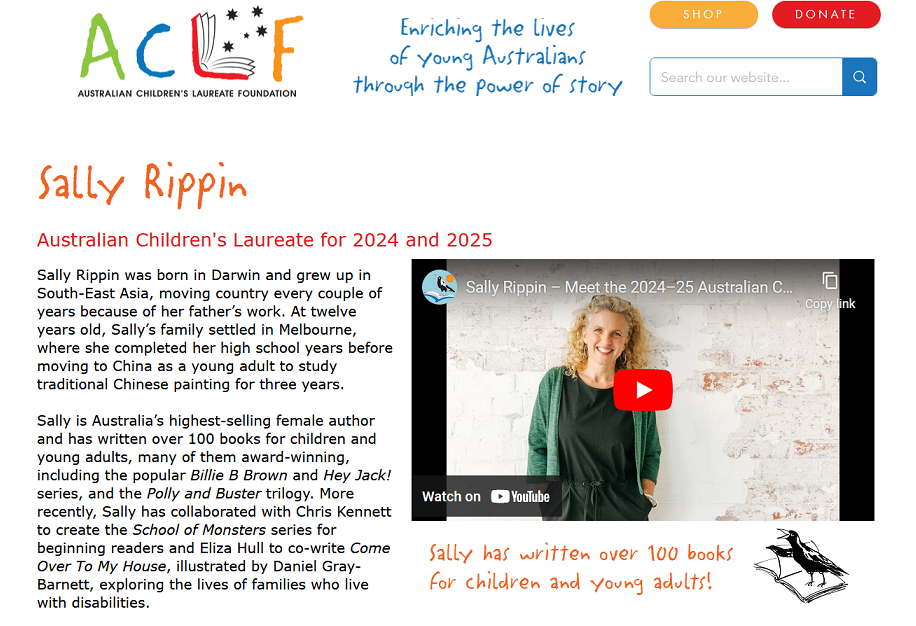
I was so excited to be invited to the launch of Sally Rippin’s two year program as Australian Children’s Laureate on Tuesday, though surprised to spot a former colleague in the crowd who was once staunchly anti-phonics and pro Reading Recovery/Fountas and Pinnell.
Then I realised: Sally is the Perzackly Perfect Person to cheer people off the sinking Balanced Literacy ship (especially since the Grattan Institute’s Reading Guarantee report), and onto ship Structured Literacy, so all kids can hurry up and start enjoying wonderful stories.
Sally isn’t just an author of great kids’ books, she’s the mum of a neurodivergent kid who struggled to read and spell, and a staunch advocate of making sure all kids are taught to crack our spelling code, instead of being encouraged to memorise and guess words. Her book for adults about this, Wild Things: how we learn to read, and what can happen if we don’t, should be in every school and local library. Here she is at the launch with queen of our activist dyslexia mums, Dyslexia Victoria Support founder Heidi Gregory.
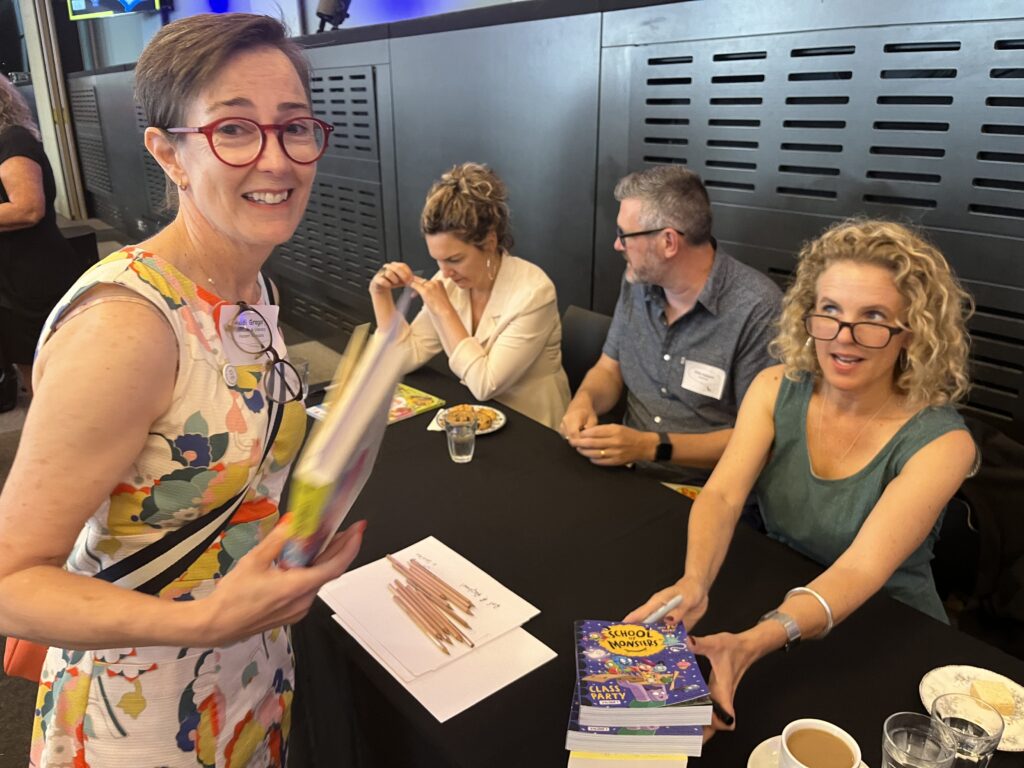
Sally’s term as Children’s Laureate is the perfect time for a strong push to dump dross like predictable/repetitive texts and rote-memorisation of high frequency word lists, and promote things like decodable texts and systematic, explicit phonics teaching in Years F-2. It’s also the perfect time to improve early identification and intervention for neurodivergent kids in schools, and knock down barriers to reading for all kids.
The Grattan Institute report (there’s a podcast about it here, and a 20-minute YouTube summary here) says kids with poor literacy currently in school could cost taxpayers $40 billion over their lifetimes, not to mention the personal cost to those kids. I cannot think of a better use of my taxes than ensuring all schools use literacy-teaching methods that are based on the best available evidence, and that struggling and neurodiverse kids whose parents can’t afford high-quality private intervention don’t miss out on it.
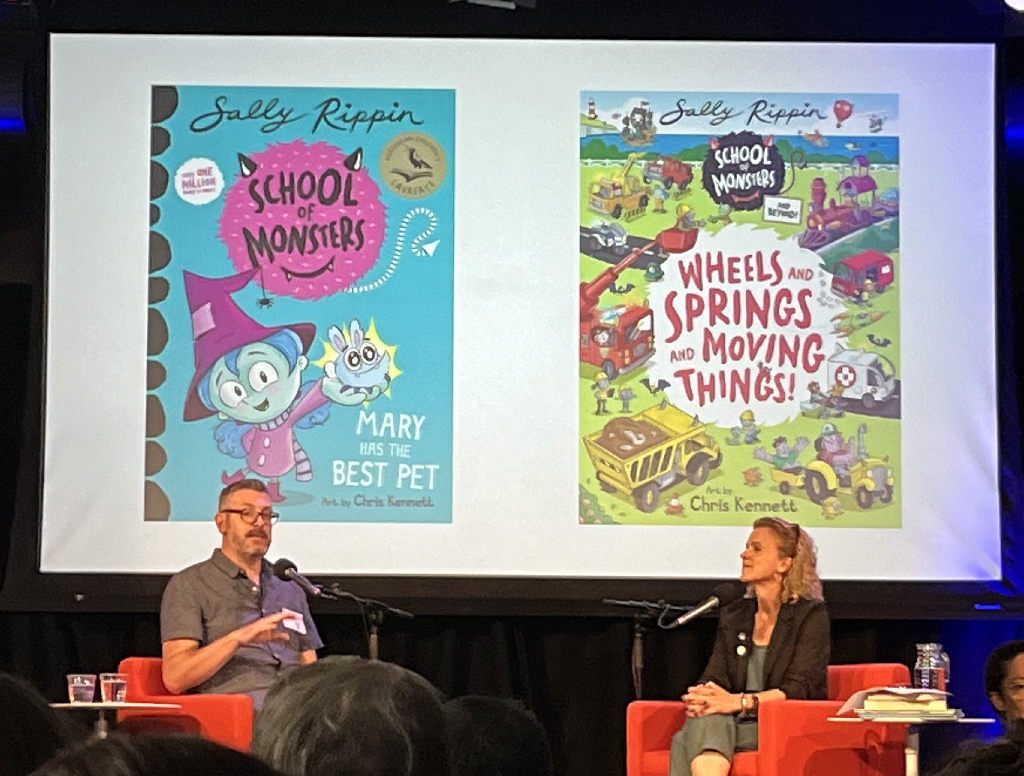
At the launch I also got a copy of Come Over To My House, a picture book co-authored by Eliza Hull, full of stories about making the world more accessible for everyone. It’s perfect for our waiting room. I also got some School Of Monsters compilations for our lending library, signed by Sally and illustrator Chris Kennett (who also drew little bats on them). Chris taught everyone at the launch how to draw a monster, which was rather hilarious.
Sally will be travelling all over Australia in the next two years, so make sure you find out when she is coming to a town or city near you (the ACLF newsletter and social media information is here), and spread the word. It’s a story well worth telling.
New Phonics With Feeling books
0 Replies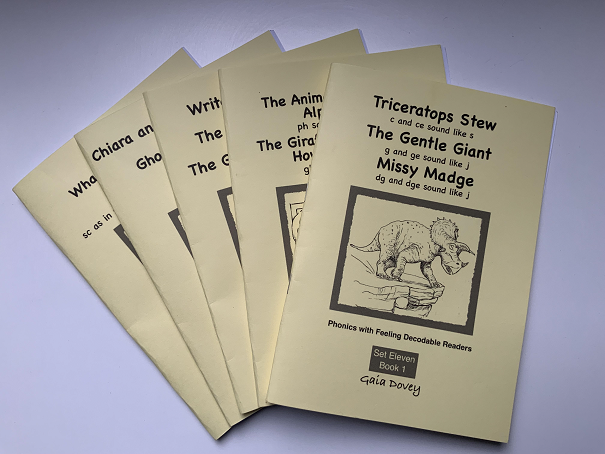
The new Extended Code Set Eleven download-and-print Phonics With Feeling readers mean there are now a dozen sets of these affordable, decodable books (one Initial Code Review set, and 11 Extended Code sets).
Set Eleven has five volumes containing 13 short stories in verse. Its focus is less common consonant spellings like the ‘kn’ in ‘know’ and the ‘ch’ in ‘chorus’, so it’s suitable for students in Year 2 or early Year 3, or slightly older catch-up learners.
It can be difficult to find text which provides plenty of practice with less common patterns, but author and illustrator Gaia (AKA Teresa, but her grandkids call her Gaia, and she created the books for them) Dovey has a knack for weaving amusing stories including lots of words with (a) specific phoneme-grapheme correspondence(s). Great for repetition to mastery!
Like all PWF sets, there’s a parent/aide version which may be printed up to five times (40c per copy), or a bulk-priced teacher/clinician version, which may be printed up to thirty times (20c per copy). They download with printable quizzes about each book, or you can use the online quizzes.
The stories are:
Triceratops Stew (250 words)
- Revising c as in cent, introducing ce as in prince
- In this story, the reader is encouraged to try a ridiculously impossible recipe.
The Gentle Giant (277 words)
- Revising g as in giant, introducing ge as in change
- This giant is gentle and kind, but small animals need to be vigilant around him.
Missy Madge (121 words)
- Introducing dg as in budget, dge as in badge
- Missy Madge is a brave little donkey who goes everywhere with her owner.
The Animals and the Alphabet (179 words)
- Introducing ph as in alphabet
- Some animals at the zoo are learning the alphabet, and others are feeling left out.
The Giraffe Who Forgot How to Laugh (151 words)
- Introducing gh as in laugh
- Joseph the giraffe has had a tough time in the zoo, but there is a simple way to make his life easier.
Write About Wrong (221 words)
- Introducing wr as in wrong
- Proteus, the protector of the sea, wants to get a message to those people who don’t care about the earth or the ocean.
The Knitting Knight (92 words)
- Introducing kn as in knit
- This knight seems to be pretty good at knitting, but he is taking a long time to make a scarf.
The Gnarled Old Gnome (80 words)
Introducing gn as in gnome
- This old gnome is keen to travel, but when he visits the city, he doesn’t like it at all.
Chiara and the Cats’ Chorus (224 words)
- Introducing ch as in chorus
- The cats in the chorus want tiaras like Chiara’s, so she finds a way to make this possible.
Ghosts and Ghouls (93 words)
- Introducing gh as in ghosts
- On her brother’s advice, Sally creates a suitably ghastly costume for Hallowe’en.
Tom Crumb (125 words)
- Introducing mb as in crumb
- Tom does some silly things, but he also does something brave.
What About Whale? (124 words)
Revising wh as in whale
- This little poem reminds children that there are plenty of words beginning with wh, and draws attention to the way in which many of these words are onomatopoeic.
Priscilla (348 words)
- Introducing sc as in scissors, sce as in reminisce
- Priscilla is interested only in herself and in the fashion scene, but she learns the hard way about collaboration.
Like the other Phonics With Feeling readers, these readers have cohesive narratives, entertaining plots, engaging characters and themes worth talking about. We hope you like them!
Phonics With Feeling Set 10 now available
1 Replies
I’ve just put six brand new Set 10 Phonics With Feeling printable decodable readers into the Spelfabet website shop. Like all these books, they cost 40c per print to make 5 copies, or 20c per print to make 30 copies. You provide the paper/card, printer and assembly time, which of course adds to the real cost, but if you’re short of funds, these are a very affordable way to boost your library of decodable text.
(more…)New decodable books for ‘o as in love’ and ‘a’ as in ‘ball’
2 Replies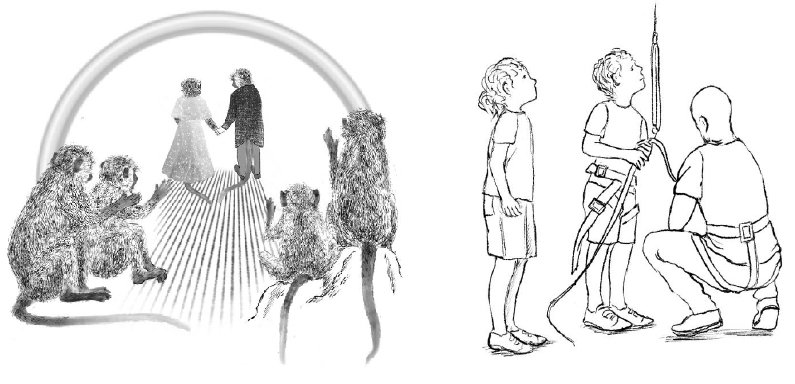
The spellings ‘o’ as in ‘love’ and ‘a’ as in ‘ball’ are in many words young children try to write. ‘One’, ‘love’, ‘some’, ‘once’, ‘all’, and ‘called’ are in the first 100 words on the Oxford Wordlist, ‘brother’, ‘other’, ‘come’, ‘water’, ‘also’, and ‘ball’, are in the 2nd 100, ‘won’ is number 206 and ‘small’ is number 228. *
However, these spelling patterns are often taught quite late in phonics teaching sequences. Many words containing these spellings are in early decodable book ‘tricky words’ lists.
Two new download-and-print Phonics With Feeling books allow children to practise words with these spellings, and notice the patterns in how they’re used: ‘love’, ‘dove’, ‘shove’, ‘glove’, ‘some’, ‘come’, ‘done’, ‘none’, ‘won’, ‘son’, ‘other’, ‘brother’, ‘mother’, ‘honey’, ‘money’ and ‘monkey, and ‘all’, ‘ball’, ‘call’, ‘fall’, ‘hall’, ‘mall’, ‘tall’, ‘wall’, ‘stall’, and ‘small’.
These new books expand the Extended Code Set 1 from three to five books. They otherwise contain only Initial Code spellings, plus the small number of ‘tricky words’ listed at the start of each book for pre-teaching. This means skilled teachers can slot them into phonics teaching sequences without introducing other, more difficult sound-spelling relationships.
The Monkeys’ Wedding
In Zulu, a sunshower is called umshado wezinkawu, meaning ‘monkey’s wedding’, so in some parts of Africa and the Caribbean, people say it’s a monkey’s wedding when the sun appears during rain. The new Phonics With Feeling Extended Code Set 1 book ‘The Monkeys’ Wedding’ is a cute, rhyming story of two monkeys in love whose wedding is almost spoilt by rain:
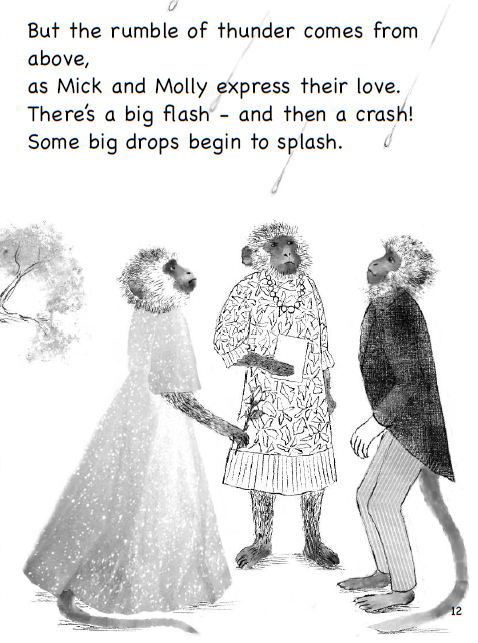
As well as giving children decoding and vowel-flexing practice, I love that this book offers an opportunity to discuss idioms, and that the idiom it refers to comes from a language and culture many English-speakers know little about.
Author and illustrator Gaia (AKA Teresa) Dovey has excelled herself with this book’s illustrations. The monkeys look fluffy enough to pat, and there are some gleefully naughty-looking little ones.
Up The Wall
The second new Extended Code Set 1 book, ‘Up The Wall’, also presents an opportunity to discuss literal and figurative meanings. It begins with a mother telling her children they’re driving her up the wall playing soccer in the hall, so they decide to go to the mall where there is a climbing wall. One child races to the top of the wall but then freezes, afraid he’ll fall. His mother must literally go up the wall to coax him, red-faced, back down. This series is not called Phonics With Feeling for nothing!

Free quizzes, and free upgrade if you have EC Set 1 already
Quizzes about these and all the other Phonics With Feeling books are available free on Wordwall, or you can download them here. Use them as is, or put some or all questions into Kahoots or other formats to suit your learners. There’s been a slight edit to the first Extended Code Set 1 book, Nancy Visits the City, which is reflected in its updated quiz, and a few other improvements across other books in the series.
Everyone who bought the original Extended Code Set 1 when it had only three books has been sent the new set of five books and updated quizzes via We Transfer. If that includes you, please download the files quickly, before the transfer expires, and let us know if you have difficulty.
Print up to 5 books @ 40c per copy, or up to 30 books @ 20c per copy
All the Phonics With Feeling books are available in either parent/aide sets (print up to 5 copies for 40c per print) or bulk teacher/clinician sets (print up to 30 copies for 20c per print). You provide the paper/card, printer and time printing and assembling them, so please factor these into your ‘is this good value?’ decision-making.
The Phonics With Feeling books aren’t for absolute beginners, as there are already plenty of good decodable books available for them. Some children will be able to read them towards the end of their first year of school, but they’re mostly for children in their second or third year of school, or slightly older catch-up learners.
More information about these books, including how to print and assemble them, can be found in this 2021 blog post. There is also an author interview here, and information about each book’s title, target spelling(s), number of words and plot in its entry in the Spelfabet shop. If you don’t already have the free sample book, it’s here.
* In the first 200 Oxford words containing a one-letter ‘o’ spelling, it is pronounced as in ‘got’ 15 times, as in ‘love’ 8 times, as in ‘so’ 7 times and as in ‘to’ 5 times.
New Phonics With Feeling books and author interview
3 Replies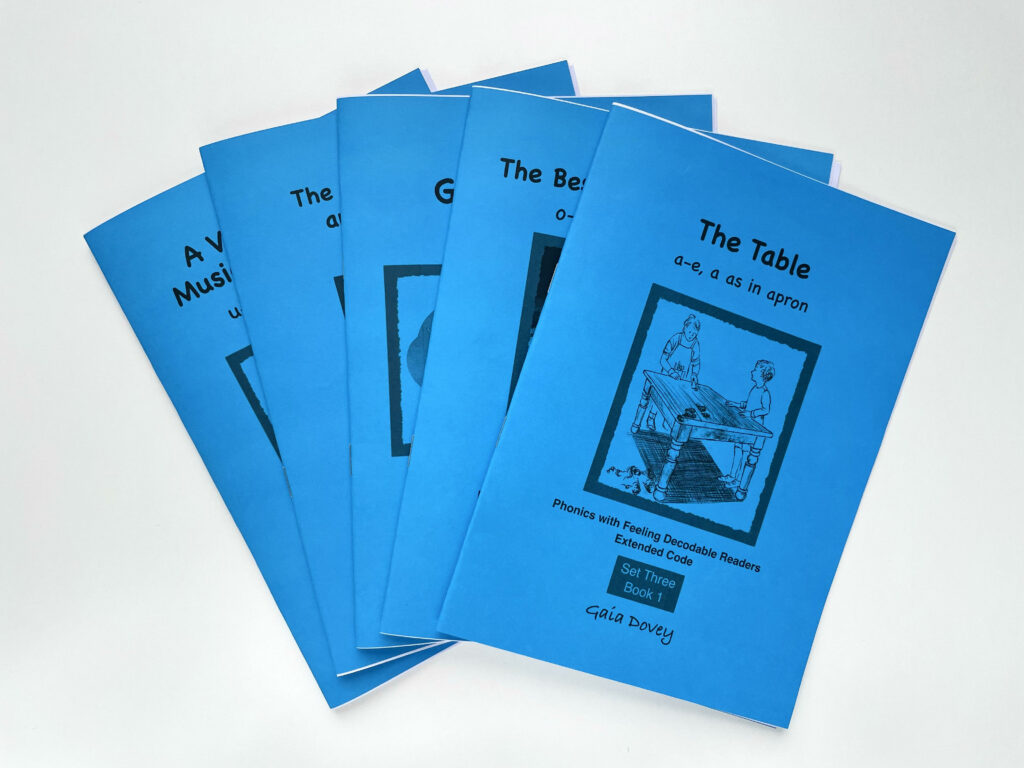
Set Three of the download-and-print Phonics With Feeling Extended Code readers are now available from the Spelfabet shop.
These books provide lots of reading practice of words with single-letter ‘long’ vowel sounds, as in ‘apron’, ‘being’, ‘final’, ‘open’ and ‘using’.
Many of these are suffixed forms of the ‘split vowel’/’silent final e’ spellings in Set Two e.g. make-making, Swede-Swedish, ice–icy, hope-hoped, cute-cutest. Word lists at the start of each book make this explicit.
The ‘c’ as in ‘ice’ and ‘g’ as in ‘age’ spellings, which often occur with these spellings, are practised in the Extended Code Set One books.
The Set Three books also include the ‘short’ vowel sounds, as in ‘at’, ‘red’, ‘in’, ‘on’ and ‘up’. When tackling new words, children should be encouraged to try both sounds for a vowel letter, if the first sound they try doesn’t produce a word that makes sense. This requires phoneme manipulation skills, and the knowledge that a spelling can represent more than one sound.
Like the other Phonics With Feeling books, the Set Three books have a print-5-copies version (parent/aide) for 40c per print, and a bulk print-30-copies version (teacher/clinician) for 20c per print. Our free quizzes (downloadable or on Wordwall) have been updated to include Set Three.
Teresa Dovey (pen name Gaia Dovey, as that’s what her grandkids call her) is the author of the Phonics With Feeling decodable readers. Here’s a 15-minute interview in which she discusses why she started writing the books, why they’re called Phonics With Feeling, her academic background in English Literature, what the books are like, who they’re for, how they can be used, and some of the feedback she’s received on them.
We hope these books make decodable text interesting and enjoyable for children, and affordable for adults, and that they help kids learn to decode as well as Teresa’s grandkids, so they can go on to enjoy reading whatever they choose.
If you’ve tried the books, please share any comments or feedback you have below.
“These are just books kids can read!”
9 RepliesMy new favourite thing is an interview with US mum Jennifer Ose-MacDonald, about how she worked with her local library to create a collection of decodable books. It’s on the excellent Teach My Kid To Read YouTube channel.
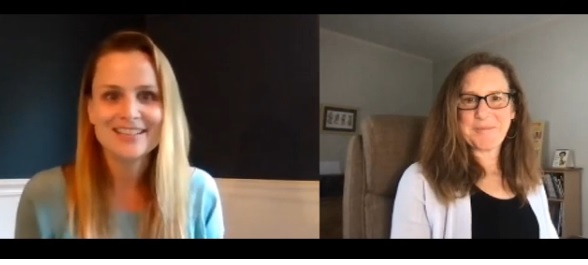
Jennifer took action after she discovered that her local libraries only had books for beginners and strugglers full of too-hard “bomb words” which deflate their reading confidence. Bomb words. A term we need, I’ll be using it a lot. Brilliant.
Jennifer says (just after the 10 minute mark, if you don’t have time to watch the whole 15 minutes) “there’s a lack of understanding in the general population about what a decodable is, because it has a name, people think that it’s special, or that it’s only for a select group of people, and that’s a misunderstanding of what they are. So I think my new role is helping people understand that THESE ARE JUST BOOKS KIDS CAN READ! That’s all they are, they’re books kids can read. And if you want kids to read books, why don’t you look at these? And you’ll see that if you pick the books that are at the right skill level, they can get through a page without having to stop and get frustrated over a word that shouldn’t be there in the first place”.
This is the first in what looks like a series of videos, so I look forward to the next one.
We all want children to experience the joy of reading. Typical books for beginners offer joy and hope, but that hope is too often dashed. Decodable books offer joy and confidence.
Thanks to Heidi from Dyslexia Victoria Support for pointing out this video, and to the people at Teach My Kid To Read for making it. It made my day, I hope it made yours too.
New printable decodables and free quizzes
11 RepliesI’ve just made free follow-up Wordwall quizzes for all the Phonics With Feeling decodable readers, including three new Extended Code Set 1 books now available (update January 2022: There are now 5 books in this set).
The 41 quizzes, of ~20 questions each, are all in a folder called Phonics With Feeling here. I’ve also made printable versions without pictures, which you can download for free here.
The online quizzes are made in the basic Wordwall Quiz format, but you can use them in Gameshow Quiz format for a few more bells and whistles, which many children enjoy, though the timer freaks some highly anxious children out. Click at the right of the startup screen if you want to switch to Gameshow format:
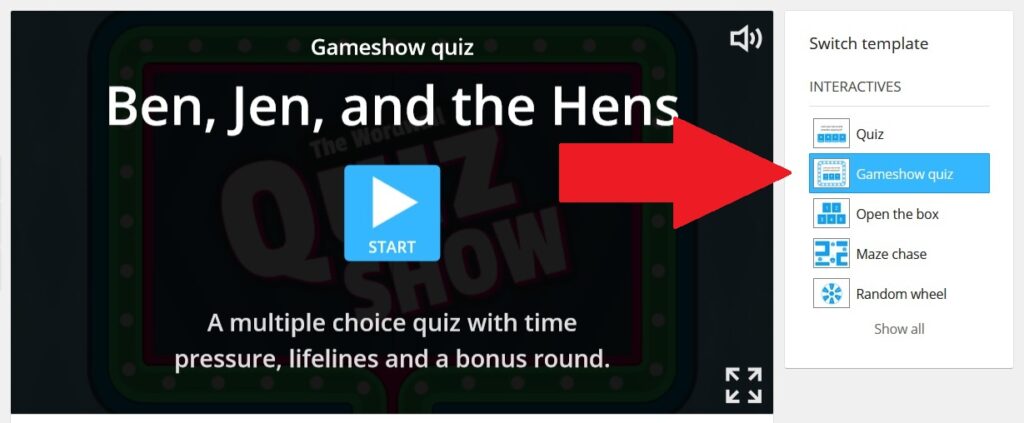
Click on the Share button below each quiz to set it as an after-reading assignment.
The quiz questions are comprehension/concept questions about the Phonics With Feeling readers, which provide extra Really-Nail-That-Pattern practice for children in Years 1 or 2, or slightly older struggling learners. The Initial Code readers are also suitable for many children approaching the end of their first school year (we Victorians call them Preps). Each quiz is written at the same decoding level as the relevant reader.
The quizzes contain some deliberate garden path questions, and traps for picture-guessers and kids inclined to read the start and end of words, and guess the middles, e.g. “Did Red Hen make a net?” followed by “Did Red Hen make a nest?” I hope this makes skimming kids do a double-take, and look more closely at ALL the letters.
The three new Extended Code Set One Phonics With Feeling readers look like this once you’ve printed them with nice coloured cardboard covers:
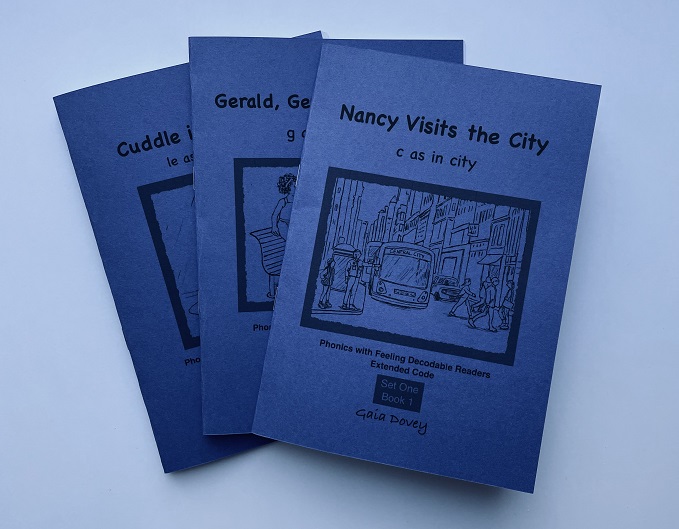
These new books target:
- /s/ as in ‘cent’ (spelt C),
- /j/ as in ‘gem’ (spelt G) and
- Unstressed final syllable ‘le’ as in ‘candle’ and ‘middle’.
Like all the other Phonics With Feeling books, the Parent/Aide version allows you to print up to 5 copies of each book for 40c per copy, plus printing and materials costs.
If you want to use the books with a whole class or caseload, the Teacher/Clinician versions allow printing of up to 30 copies of each book, which works out at 20c per print. We hope this allows teachers to use them as class sets, and have a few spares to replace any that get lost, leaked on by drink bottles, chewed by puppies etc.
The download-and-print quizzes don’t have pictures, and may be useful as follow-up paper-based activities, or you might like to turn the questions into Kahoot!s, or other games/competitions. If my quizzes are too long for your students, just leave some of the questions out, and tweak the remainder. Save yourself the brain-frying experience of writing decodable text from scratch.
40 Phonics with Feeling books are currently available, but I’ve made 41 Wordwall quizzes, because the last Set Seven book has two stories in it – ‘Sue and the Glue’ and ‘Robot Andrew’. The Phonics With Feeling Extended Code Set Three should be available in November, and will target single-letter ‘short/long’ vowels, providing children with many opportunities to practise ‘flipping’ vowel sounds till they get a word they know that makes sense in context (e.g. the ‘o’ in ‘poster’ and ‘roster’).
Still too hard for your learners? Try the new, free Sounds-Write texts
If these books and quizzes are too hard for your kids, and you need more basic decodable texts, Sounds-Write has a cute new free e-book First Steps Collection about strange pets (including a bug, a fox, a crab, a skunk, a moth, a chimp and a squid), for Units 4-11 of Sounds-Write. They’re a bit easier than the original Sounds Write books. Printed versions are also available, though I think at the time of writing they haven’t yet arrived at Australian suppliers DSF, Soundality or Rise Literacy.
If even those books are too difficult for your learner, we’ve made some 10-question WordWall quizzes for Sounds-Write Units 1-3:
- Unit 1 (I realised two of my local MPs are called Tim and Sam, so it’s nonfiction quiz)
- Unit 2 (the featured Pam is Prof Pamela Snow, again very much nonfiction)
- Unit 3.
We’re working on quizzes for later units now, if you can smell our brains frying.
Hope you find at least some of this useful, especially those of you who are still (like us, sigh) in COVID-19 lockdown. Stay well!


